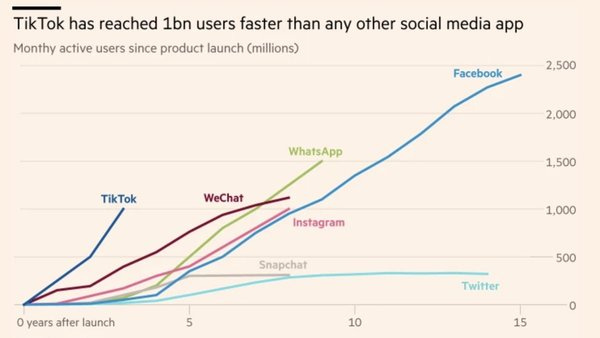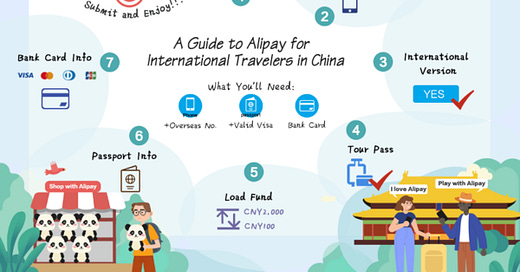Rishi Taparia - Issue #108
This week we look at the implications of Alipay and WeChat Pay allowing tourists onto their platforms, PayPal’s latest push into offline commerce, TikTok’s meteoric rise, changing the always-on work culture and more. Enjoy!
[My blog post] China Opens Its Payments Doors
Being a tourist in China just became a whole lot easier. Alipay and WeChat Pay are now available for use by foreigners. In this piece I outline why this is a significant milestone for the companies and the country, and a harbinger for global expansion. TL;DR - it is the beginning of phase 2 in the larger payments strategy of both Chinese firms as they now set their sights on worldwide expansion.

Onboarding to Alipay as a tourist
PayPal and Venmo to move into in-store payments 'next year'
PayPal has had a tumultuous experience with in-store payments. It’s been on again off again more than Antonio Brown’s 2019 football season, and it makes sense why: in store payments are going to be a necessary part of any long term payments strategy. As online and offline payments converge, with online players coming offline and vice versa, a complete payments stack is now table stakes. Last year PayPal bought iZettle out of Europe to make a broader push in region (and to prevent Square from gaining a foothold in the market). Now, PayPal CEO Dan Schulman says it’s to begin a big push into in-store payments in 2020, via PayPal and Venmo brands and using NFC and QR codes.
“We can actually simply put in a PayPal Wallet experience for physical stores and anywhere those other wallets are accepted — it’s exactly the same technology, it’s near field communications technology — we’ll be able to use those as well.“
How to become TikTok famous
TikTok is hard to escape these days. The company has reached over a billion users faster than any other social media platform in history. It’s gotten so much attention that the US government is launching a probe into the company to determine if the company poses a national security risk. Musical.ly, a precursor company to TikTok was a US domiciled business that Chinese company ByteDance purchased for $1bn without clearing CFIUS and now regulators are miffed. Side note: the national security risk is probably more around our teens obsessing about creating viral 15 second videos that are distracting from actual learning, work, etc. but that’s probably the old man in me coming out.
A few weeks ago we talked about the culture of TikTok and how teens are shunning Instagram for “a fun version of LinkedIn”. This piece offers another look into the business and becoming TikTok famous.
Many of his friends make fun of him for using the app; they are primarily glued to Instagram, which he sees as “basically a fun version of LinkedIn” due to its emphasis on a polished image. “ A lot of people didn’t take this idea seriously because it’s a sort of goofy social-media format,” he explains. But for a generation that have had smartphones since middle school or even earlier, TikTok’s goofiness is part of its magic.
Teenagers today have watched their peers broadcast their lives online for years, with some even becoming millionaires through platforms such as YouTube, whose first video was uploaded on April 23 2005. As their parents once flocked to Facebook, young people have found their own communities by filming themselves with the front-facing cameras on their smartphones and posting their thoughts to the world through websites and apps. Their infatuation with video has spawned a new media hierarchy with its own pantheon of celebrities.

Staggering growth, no matter how you cut it
It’s Time to Blow Up Our ‘Always On’ Work Culture
We live in an ‘always on’ work culture. We are accessible at any time, expected to respond to the requests of colleagues and clients whenever they come in. If you’ve got young children then you’re likely leaving work before your peers (remember when leaving at 5p was the norm?) to pick up your kid from after-school activities, get them home, get them fed, play, bedtime routine, put them to sleep…only to log back on again. Well, this week two experiments have offered hope there is a better way. One German entrepreneur put in to place a 5 hour workday and saw the same level of output as a typical 8-9. Microsoft Japan announced a 4-day workweek this summer and saw productivity jump by 40%. As the author Cal Newport writes:
If like many digital knowledge workers, you’re exhausted by endless work and flooded inboxes, the good news is that better and more sustainable ways of producing valuable output with your brain might be coming — if we can find enough visionaries willing to try out “radical” new ideas about how best to get things done.
French Baguettes From a Vending Machine? ‘What a Tragedy.’
France is losing her bakeries. In a country where it is said ‘Without bread, there is no more life’ and the average distance to the nearest bakery is a five minute walk, small town bakeries are shutting their doors. Why? They are unable to motivate the next generation to take on the trade.
Young people are no longer drawn to the long hours of the traditional bakers who live above their store. Shopping malls have taken root on the periphery of rural areas, drawing in people who are content to buy at supermarkets or chains. Customers, especially the young, are not eating as much bread.
Man’s Biggest Friend
The Asian elephant is the second largest land-mammal (second only to its cousin the African bush elephant). Incredibly intelligent, powerful and a key part of Asian culture, this beautiful piece about a beautiful animal is actually a book review of Jacob Shell’s Giants of the Monsoon Forest: Living and Working With Elephants. Worth a read, if only to distract yourself from your day today with thoughts of friendly giants.
Quote I’m thinking about: “There is no “trickle-down” solution to the problem of work. On the contrary, sustaining good work must be made one of the explicit goals of innovation, a challenge to be addressed—and met—with openness, transparency, and a sense of urgency.” Ellen Ruppel Shell



